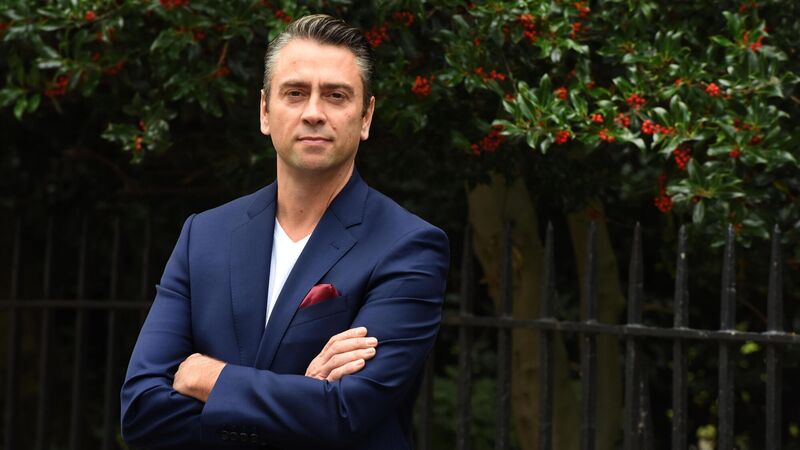Richard Hogan: Having dyslexia doesn't mean you're stupid - I should know

Richard Hogan is an ambassador for Dyslexia Ireland. Photograph Moya Nolan
One of the great honours of my life is being an ambassador for Dyslexia Ireland. It is such a joy working and meeting other dyslexic children from all over Ireland.
Hearing their stories and their struggles living with dyslexia. I am always struck by what I have come to call, ‘the dyslexic voice’. It is like Ozymandias, it rules with the sneer of cold command. It is brutally harsh and burgles all joy and happiness from the child’s life. In fact, I have met adults too who have laboured with such a destructive internalised voice.
It sneers at them; you are not clever, you will get found out, you better please everyone, no one would like you as you are. They live believing they have a terrible secret they have to keep hidden from everyone at all costs. I know that voice because I lived with it for many years. like a shameful secret I kept it to myself, for fear of anyone finding out I had dyslexia.
I used to think at least I’m one of the lucky ones, mine is mild and not that intrusive in my life. But I was lying to myself, it was very intrusive, any time I’d be asked to write on a board at a conference a wave of panic would wash over me, how the hell am I going to circumnavigate this one!
When I was in school and there would be a spelling test, I’d have to employ all imaginative reasons for not going to school that day; maybe I had Beri Beri disease or I had been out in the fields that day, maybe some tick buried itself into my spine and I couldn’t go!
The last thing I wanted was to be confronted with the truth; that there was something wrong with me. That was my greatest fear, and I developed all sorts of interventions to protect myself from that brutal reality. I became difficult to manage in school. I could handle being called ‘wild’, or a ‘messer’ but couldn’t handle being described as weak or stupid.
I meet so many students in my work both clinically and in education, who are experiencing the same thing I did 40 years ago. They believe they are stupid. I have yet to meet a stupid person in all my years working with adolescents. But it has devastating consequences for how the person talks to themselves.
The longest and most significant relationship you are ever going to have is that one in your head. If that is not supportive, kind, and compassionate, it will be a long, cruel life. How teachers view dyslexia and speak to students about it, is vitally important if we want to improve a child’s internalised voice. I had a student tell me that their teacher corrected their spelling, and when the student pointed out they had dyslexia, the teacher’s response was, "That’s not dyslexia, that’s just pure stupid".
The young man was in my clinic, head down, tears flowing. When I pointed out that a comment like that reflects the teachers' capacity and competency and is nothing about their ability or talent, his head came up and he started to smile.
Parents too can have limiting ideas about dyslexia which they implicitly or explicitly pass to their child. I often meet parents who are at pains to tell me their other child is very bright. When I explain that this child is also very bright, I can see them labour with the idea. Labels don’t predict the future they write. And when we think that dyslexia means something about IQ or talent, we write a very negative future for our children.
One of the most important moments in my life, as a child, was when I read that one of my favourite poets, WB Yeats was dyslexic. How could the man who wrote, ‘Sailing to Byzantium’ struggle with English? I loved poetry because of how the poet bent language. It was how my mind worked. I never really saw or cared for the rules. They were there to break.
I remember reading that his father used to give out to him for his handwriting and spelling. I had something in common with a genius. And then when I read Einstein was also dyslexic, I started to think maybe we don’t understand what dyslexia is. Maybe, it doesn’t mean you are bad at English and maybe - just maybe - it doesn’t mean you are stupid. That was an important insight for me, that set me free.
And then when I got a laptop in university, I started to sing. The pen held my ideas prisoner, the laptop allowed me to sing. Technology cured everything I had laboured with in one go. I would never have written books had I been born before the arrival of technology.
Even in primary school, I remember trying to write my essays on an old typewriter I had. I felt something happened when I typed, that was muted when I used my hand.
I have just finished a six-year study exploring inclusion in Irish and American schools. Children with learning differences, need to be spoken to by professionals that understand what it is they are living with. We need more education in teacher training about dyslexia so that when a teacher is working with a dyslexic student, they don’t see limitations but all the limitless potential that is there.






